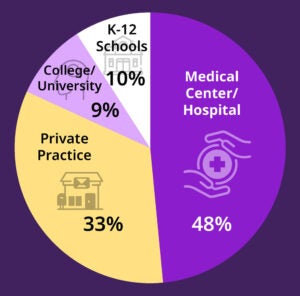Pediatric School Psychology
PhD Concentration in Health Psychology
APA-accredited as a school psychology doctoral program
Graduates understand K-12 education, child development, & school systems to support learning, behavior, & mental health. They apply biopsychosocial & tiered intervention frameworks for behavioral health across settings and learn research & clinical skills using data-driven decisions & evidence-based practices.
At a Glance
Semester Credit Hours?
Pediatric School Psychology consists of 102 semester hours.
How long will it take?
5 years full-time study from Bachelors. Student entering with a Masters in psychology or related field may qualify for transfer credits (min. 3 years full-time study)
When can I start?
You can begin the program only in the Fall semester.
Program delivery mode?
We are an on-campus, face-to-face training program. Unable to accommodate distance-education learners at this time.
Curriculum
See ECU Graduate Catalog for official degree requirements for Health Psychology PhD, Pediatric School concentration.
| Area of Study | Course Requirements |
|---|---|
| Professional Standards & Ethics | 1 course |
| Foundations of Psychology | 8 courses |
| Research Methods & Design | 3 courses + Thesis & Dissertation |
| Pediatric School Psych Core | 3 courses |
| Interventions | 3 courses |
| Assessment | 3 courses |
| Practicum | 8 courses (or min. 21 semester hrs.) |
| Internship | 2 courses |
By the Numbers
100%
Doctoral students funded with tuition remissions & graduate assistantships
89%
State Board Licensure Percentage* (2014-2024)
*Remaining grads hold School Licensure/Certification or teach in university settings.
100%
Students who obtained paid internships *89% APA-accredited
Where our Pediatric School Psychology Grads are Working (2024)
Graduates of Pediatric School Psychology work within various settings that serve children/adolescents and their families, including public schools, developmental centers, medical settings, universities, & private practices.

ECU Health Psychology PhD, Pediatric School concentration, meets educational requirements for licensure in different U.S. states
Consumer Information Disclosures (PDF)
What Our Graduates Say
Accreditation
Pediatric School Psychology doctoral concentration at ECU is accredited by the American Psychological Association as a school psychology program. Our next review is due in 2034. For more information on APA accreditation visit the APA Accreditation website or contact the APA Office of Program Consultation and Accreditation, 750 First Street NE, Washington, DC 20002-4242 | PH: 202-336-5979 | apaaccred@apa.org
Admission Requirements
See the ECU Graduate School for the most up-to-date information about Admissions and the FAQ links below for details about requirements.
To see program application links, type “Psychology” in the [Search Programs] box on the ECU Find Your Program webpage, which is linked below.
Pediatric School Psychology Faculty

Marissa Baudino
Assistant Professor
Willing to Take a Doctoral Student Next Year? Yes

Jeannie Golden
Associate Professor
Willing to Take a Doctoral Student Next Year? Yes

Ajlana Music
Clinical Assistant Professor
Willing to Take a Doctoral Student Next Year? No

Brandon Schultz
Associate Professor
Willing to Take a Doctoral Student Next Year? Yes

Debbie Thurneck
Clinical Associate Professor & Director of the PASS Clinic
Willing to Take a Doctoral Student Next Year? No

Christy Walcott
Associate Professor
Willing to Take a Doctoral Student Next Year? Yes
